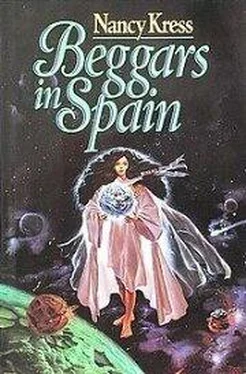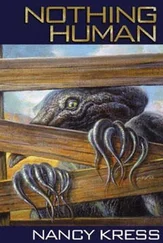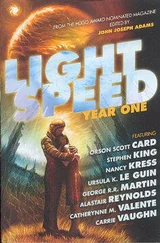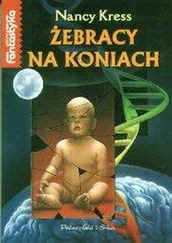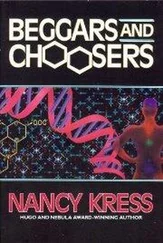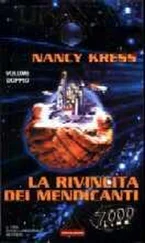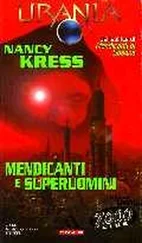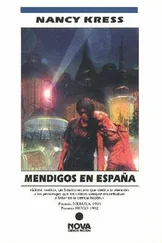When Leisha was five she and Alice started school. Daddy’s driver took them every day into Chicago. They were in different rooms, which disappointed Leisha. The kids in Leisha’s room were all older. But from the first day she adored school, with its fascinating science equipment and electronic drawers full of math puzzlers and other children to find countries on the map with. In half a year she had been moved to yet a different room, where the kids were still older, but they were nonetheless nice to her. Leisha started to learn Japanese. She loved drawing the beautiful characters on thick white paper. “The Sauley School was a good choice,” Daddy said.
But Alice didn’t like the Sauley School. She wanted to go to school on the same yellow bus as Cook’s daughter. She cried and threw her paints on the floor at the Sauley School. Then Mommy came out of her room — Leisha hadn’t seen her for a few weeks, although she knew Alice had — and threw some candlesticks from the mantelpiece on the floor. The candlesticks, which were china, broke. Leisha ran to pick up the pieces while Mommy and Daddy screamed at each other in the hall by the big staircase.
“She’s my daughter, too! And I say she can go!”
“You don’t have the right to say anything about it! A weepy drunk, the most rotten role model possible for both of them… and I thought I was getting a fine English aristocrat!”
“You got what you paid for! Nothing! Not that you ever needed anything from me or anybody else!”
“Stop it!” Leisha cried. “Stop it!” There was silence in the hall. Leisha cut her fingers on the china; blood streamed onto the rug. Daddy rushed in and picked her up. “Stop it,” Leisha sobbed, and didn’t understand when Daddy said quietly, “ You stop it, Leisha. Nothing they do should touch you at all. You have to be at least that strong.”
Leisha buried her head in Daddy’s shoulder. Alice transferred to Carl Sandburg Elementary School, riding there on the yellow school bus with Cook’s daughter.
A few weeks later Daddy told them that Mommy was going away to a hospital, to stop drinking so much. When Mommy came out, he said, she was going to live somewhere else for a while. She and Daddy were not happy. Leisha and Alice would stay with Daddy and they would visit Mommy sometimes. He told them this very carefully, finding the right words for truth. Truth was very important, Leisha already knew. Truth was being true to yourself, your specialness. Your individuality. An individual respected facts, and so always told the truth.
Mommy — Daddy did not say but Leisha knew — did not respect facts.
“I don’t want Mommy to go away,” Alice said. She started to cry. Leisha thought Daddy would pick Alice up, but he didn’t. He just stood there looking at them both.
Leisha put her arms around Alice. “It’s all right, Alice. It’s all right! We’ll make it all right! I’ll play with you all the time we’re not in school so you don’t miss Mommy!”
Alice clung to Leisha. Leisha turned her head so she didn’t have to see Daddy’s face.
KENZO YAGAI WAS COMING to the United States to lecture. The title of his talk, which he would give in New York, Los Angeles, and Chicago, with a repeat in Washington as a special address to Congress, was “The Further Political Implications of Inexpensive Power.” Leisha Camden, eleven years old, was going to have a private introduction after the Chicago talk, arranged by her father.
She had studied the theory of cold fusion at school, and her global studies teacher had traced the changes in the world resulting from Yagai’s patented, low-cost applications of what had, until him, been unworkable theory: the rising prosperity of the Third World; the death throes of the old communistic systems; the decline of the oil states; the renewed economic power of the United States. Her study group had written a news script, filmed with the school’s professional-quality equipment, about how a 1985 American family lived with expensive energy costs and a belief in tax-supported help, while a 2019 family lived with cheap energy and a belief in the contract as the basis of civilization. Parts of her own research puzzled Leisha.
“Japan thinks Kenzo Yagai was a traitor to his own country,” she said to Daddy at supper.
“No,” Camden said, “ some Japanese think that. Watch out for generalizations, Leisha. Yagai patented and licensed Y-energy in the United States because here there were at least the dying embers of individual enterprise. Because of his invention, our entire country has slowly swung back toward an individual meritocracy, and Japan has slowly been forced to follow.”
“Your father held that belief all along,” Susan said. “Eat your peas, Leisha.” Leisha ate her peas. Susan and Daddy had only been married less than a year; it still felt a little strange to have her there. But nice. Daddy said Susan was a valuable addition to their household: intelligent, motivated, and cheerful. Like Leisha herself.
“Remember, Leisha,” Camden said, “a man’s worth to society and to himself doesn’t rest on what he thinks other people should do or be or feel, but on himself. On what he can actually do, and do well. People trade what they do well, and everyone benefits. The basic tool of civilization is the contract. Contracts are voluntary and mutually beneficial. As opposed to coercion, which is wrong.”
“The strong have no right to take anything from the weak by force,” Susan said. “Alice, eat your peas, too, honey.”
“Nor the weak to take anything by force from the strong,” Camden said. “That’s the basis of what you’ll hear Kenzo Yagai discuss tonight, Leisha.”
Alice said, “I don’t like peas.”
Camden said, “Your body does. They’re good for you.”
Alice smiled. Leisha felt her heart lift; Alice didn’t smile much at dinner any more. “My body doesn’t have a contract with the peas.”
Camden said, a little impatiently, “Yes, it does. Your body benefits from them. Now eat.”
Alice’s smile vanished. Leisha looked down at her plate. Suddenly she saw a way out. “No, Daddy, look — Alice’s body benefits, but the peas don’t! It’s not a mutually beneficial consideration, so there’s no contract! Alice is right!”
Camden let out a shout of laughter. To Susan he said, “Eleven years old… eleven .” Even Alice smiled, and Leisha waved her spoon triumphantly, light glinting off the bowl and dancing silver on the opposite wall.
But even so, Alice did not want to go hear Kenzo Yagai. She was going to sleep over at her friend Julie’s house; they were going to curl their hair together. More surprisingly, Susan wasn’t coming either. She and Daddy looked at each other a little funny at the front door, Leisha thought, but Leisha was too excited to think about this. She was going to hear Kenzo Yagai .
Yagai was a small man, dark and slim. Leisha liked his accent. She liked, too, something about him that took her a while to name. “Daddy,” she whispered in the half-darkness of the auditorium, “he’s a joyful man.”
Daddy hugged her in the darkness.
Yagai spoke about spirituality and economics. “A man’s spirituality, which is only his dignity as a man, rests on his own efforts. Dignity and worth are not automatically conferred by aristocratic birth; we have only to look at history to see that. Dignity and worth are not automatically conferred by inherited wealth. A great heir may be a thief, a wastrel, cruel, an exploiter, a person who leaves the world much poorer than he found it. Nor are dignity and worth automatically conferred by existence itself. A mass murderer exists, but is of negative worth to his society and possesses no dignity in his lust to kill.
Читать дальше
